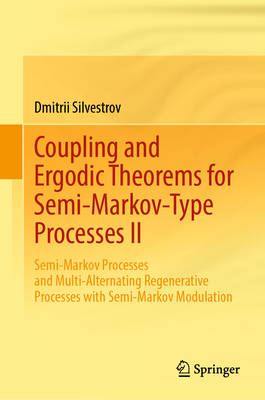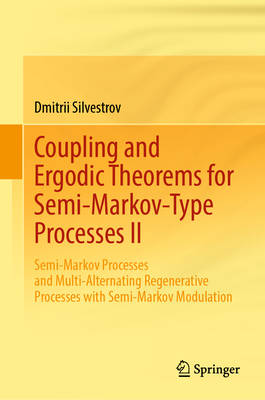
- Afhalen na 1 uur in een winkel met voorraad
- Gratis thuislevering in België vanaf € 30
- Ruim aanbod met 7 miljoen producten
- Afhalen na 1 uur in een winkel met voorraad
- Gratis thuislevering in België vanaf € 30
- Ruim aanbod met 7 miljoen producten
Zoeken
Coupling and Ergodic Theorems for Semi-Markov-Type Processes II
Semi-Markov Processes and Multi-Alternating Regenerative Processes with Semi-Markov Modulation
Dmitrii Silvestrov
Hardcover | Engels
€ 213,95
+ 427 punten
Omschrijving
Ergodic theorems are a cornerstone of the theory of stochastic processes and their applications. This book is the second volume of a two-volume monograph dedicated to ergodic theorems. While the first volume centers on Markovian and regenerative models, the second volume extends the scope to semi-Markov processes and multi-alternating regenerative processes with semi-Markov modulation and delves into ergodic theorems with explicit power and exponential upper bounds for convergence rates for such processes. The book offers a powerful and constructive probabilistic framework by employing coupling ergodic theorems presented in the first volume in conjunction with the method of artificial regeneration and test functions. Theoretical findings are illustrated with applications to semi-Markov Monte Carlo algorithms and perturbed queuing systems featuring explicit convergence rate bounds. Many results presented in the book are groundbreaking, appearing in publication for the first time. Designed with researchers and advanced students in mind, the content is thoughtfully structured by complexity, making it suitable for self-study or as a resource for upper-level coursework. Each chapter is self-contained and complemented by a comprehensive bibliography, ensuring its value as a long-lasting reference. An essential resource for theoretical and applied research, this book significantly contributes to the field of stochastic processes and will remain a key reference for years to come.
Specificaties
Betrokkenen
- Auteur(s):
- Uitgeverij:
Inhoud
- Aantal bladzijden:
- 560
- Taal:
- Engels
Eigenschappen
- Productcode (EAN):
- 9783031893148
- Verschijningsdatum:
- 29/10/2025
- Uitvoering:
- Hardcover
- Formaat:
- Genaaid
- Afmetingen:
- 150 mm x 226 mm
- Gewicht:
- 952 g

Alleen bij Standaard Boekhandel
+ 427 punten op je klantenkaart van Standaard Boekhandel
Beoordelingen
We publiceren alleen reviews die voldoen aan de voorwaarden voor reviews. Bekijk onze voorwaarden voor reviews.







